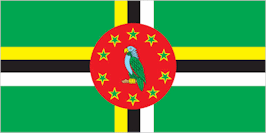Dominica - Foreign Relations
 The Ministry of Foreign Affairs has responsibility for formulating and implementing the foreign policies of the Government of the Commonwealth of Dominica. The Ministry conducts all diplomatic and consular relations with foreign governments and represents Dominica in international organisations. It also participates in relevant bilateral and multilateral negotiations, furthering and protecting Dominica's domestic and international interests.
The Ministry of Foreign Affairs has responsibility for formulating and implementing the foreign policies of the Government of the Commonwealth of Dominica. The Ministry conducts all diplomatic and consular relations with foreign governments and represents Dominica in international organisations. It also participates in relevant bilateral and multilateral negotiations, furthering and protecting Dominica's domestic and international interests.
Dominica is a Caribbean country that demonstrates its support for the government of Venezuela and urges the Organization of American States not to intervene in the internal affairs of that country and to respect its sovereignty. Like its Eastern Caribbean neighbors, the main priority of Dominica's foreign relations is economic development. The country maintains missions in Washington, New York, London, and Brussels and is represented jointly with other Organization of Eastern Caribbean States (OECS) members in Canada.
Dominica also is a member of the Caribbean Development Bank (CDB) and the British Commonwealth. It became a member of the United Nations and the International Monetary Fund (IMF) in 1978 and of the World Bank and Organization of American States (OAS) in 1979.
In March 2004, Dominica established diplomatic relations with the People's Republic of China. Previously, Taiwanese technicians had conducted an agricultural research program in Dominica, and although no trade developed between the two nations, Taiwan supplied regular infusions of aid for small projects in schools, sporting facilities, and health services.
In January 2008, Dominica joined the Bolivarian Alliance for the Americas (ALBA).
Dominica had deep historical and cultural ties to Britain and was a member of the Commonwealth of Nations. Britain also provided economic assistance to the country and was the single largest recipient of Dominican exports. Despite these links, the intervention in Grenada strained relations between Dominica and the Commonwealth. Leaders of African nations attending the Meeting of Heads of Government of the Commonwealth in New Delhi in November 1983 charged that the intervention had violated the principle of nonintervention in the internal affairs of sovereign countries. Charles categorically rejected the African position and stated that the intervention was vital to the interests of the Commonwealth Caribbean. Charles also criticized British prime minister Margaret Thatcher for her initially hostile reaction to the Grenada intervention, accusing Thatcher of having turned her back on her friends. The government also attempted to extend Dominica's international relations farther afield and strengthened diplomatic ties with both Taiwan and the Republic of Korea (South Korea). Relations within the Caribbean Community and Common Market (Caricom) had been difficult as evidenced by the virtual collapse of Caricom's Multilateral Clearing Facility, the creation of nontariff barriers between member states, the violation of rules of origin regulations (utilizing extraregional garments, for example), and major difficulties over foreign policy. Partly in response to these Caricom difficulties, Charles worked vigorously with the six other members of the OECS to strengthen that subregional grouping.
|
NEWSLETTER
|
| Join the GlobalSecurity.org mailing list |
|
|
|

